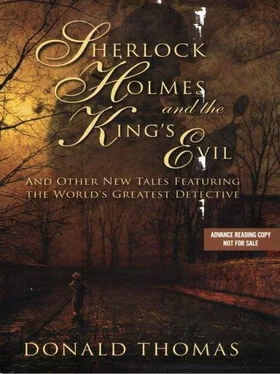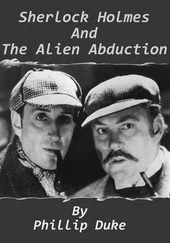Then, as calmly as if this were Baker Street, Holmes came silently down the stairs, leading a girl by the hand. She was slightly-built, undernourished, about fourteen or fifteen years old, dishevelled, pale and terrified. My friend’s clothes were covered in dust and there were streaks of black about his face.
“This is Anna,” he said reassuringly, “she does not speak perfect English but she is no Anarchist. The next time you search a house of this kind, inspector, you might bear in mind that the upper floor is very likely to be a sweatshop. The girls or children who work for a pittance as seamstresses sometimes hide up there to sleep the night, rather then find their bed under the arches of the bridges or the corners of the markets. They know very well how to conceal themselves from a search.”
The inspector ignored him, shouting to his men to fall in with their shotguns and prepare to assault the gunmen’s strongpoint by the back door and the stairs. Holmes stared coldly at their sporting weapons.
“You will be slaughtered by their Mausers. They will get off twenty or thirty shots for every one of yours. In any case, you have left it too late. The building is ablaze. The bullets have hit the gas-pipes and set the fumes alight. Even if you are not ambushed on the stairs, you will not reach the room where the men are defending themselves. There are two of them left and they have made their choice of how to die. You had far better grant them that.”
As we stood in the yard, the flames were already eating at the edges of the wooden stairs. There was no more talk of storming the building. We soon heard that the crowds in the street had seen one gunman lit by the flames as he stood behind the glass panels of the front door. A burst of rifle-fire drove him back, grievously wounded or dead. A second surge of flame illuminated another of the defenders, face-down on a bed with his face buried in the pillow. It seemed he was already dead.
The firing from the blazing house stopped long before the arrival of the horse artillery. By the time that I had accompanied Holmes and his young charge to the front of the building, the shooting had stopped on both sides. A fire engine followed the artillery. It was impossible to imagine that anyone was left alive as the blazing attic, its timbers glowing and masonry crashing, collapsed into the floor below, where the defenders had been.
By now the guardsmen were firing into the front door and the street-level windows at point-blank range. There was no response. The house was a roaring column of flame as exploding gas fuelled the conflagration. The Scots Guards still knelt with rifles aimed at the doorway, lest a fugitive might bolt down the street but the time for that was long past. When the roof and the floors had fallen in and a volume of flame shot skywards, the besiegers formed themselves up to withdraw. Only the hoses of the firemen played on the remains.
How many of the gunmen died or whether any escaped, before or after the arrival of the police, was anyone’s guess. Later on, the remains of the house were searched. Among the burnt debris were the head and arms of one man and the skull of another with a bullet-hole in its back. Several Mauser pistols which had exploded in the heat of the fire lay close by. The remains of a dressmaker’s dummy and the bodies of several sewing-machines were all that remained of the Union Jack Tailoring shop. There were parts of metal bedsteads and containers for acetylene or gas, which had the shape of torpedoes and a usefulness as bomb-cases. From these fragments, the world was to construct what explanation it could.
Anna, the protégée of Sherlock Holmes, was handed over with all kindness to the Salvation Army matrons, who had set up their camp beyond the police cordon to minister as they might. They would return her to her mother and sisters in Whitechapel.
“But how could a girl like that know such a thing?” I demanded. “She is Polish? And yet she knows the seaman’s distress signal of a Union Jack flown upside down?”
Holmes smiled.
“Her father is Polish and served for many years in the merchant marine. On a humbler level than Mr Joseph Conrad, but no less usefully, he entertained her with the tales and customs of the sea. This one caught her imagination. It is not a custom that you had encountered?”
I was a little put out by this.
“It was one that I knew perfectly well. But with bullets flying in all directions I was hardly likely to keep watch as to whether someone had turned a tradesman’s card in a window upside down.”
He nodded indulgently.
“Indeed so. I fear that on such occasions, my dear Watson, you see but you do not observe. The distinction is quite clear and not unimportant.”
The fire had, as it seemed to me, destroyed many of the answers to the mystery which led to the “Siege of Sidney Street.” The most intriguing, if the press were to be believed, was what had become of the sinister and cold-blooded figure of “Peter the Painter.” Had he died in the fire or was he safely back in Paris, or Berlin, or Moscow? He was certainly real enough. He had a history of subversion and assassination in the police dossiers of the world. He also had a future in the revolutionary government of the Soviet Union, though Sherlock Holmes was one of the very few who predicted that. No one could agree as to who commanded him or who obeyed him, let alone in what disguise he might be found. In England, it seemed that he had come and gone, died perhaps, in the few weeks following the Houndsditch murders.
Because I had seen him, I was pestered a little by the press but I could tell them nothing they did not know already. I thought he was one more paragon of evil who had set out to destroy Sherlock Holmes-and had failed.
So I sat down to compose our narrative of the Anarchist uprising. Holmes was out and it was a fine February afternoon with the rime of the frost still clinging to the grass of the Regent’s Park. Being a Saturday, our landlady Mrs Hudson had gone to visit her sister in Dulwich. Even Mary Jane, the maid-of-all-work, had gone walking with her “young man.” The house was quiet, the traffic subdued, and I had begun.
On a morning in early December, three years before the Great War, Mrs Hedges brought us the unusual story of a yellow canary…
I had written a page or two more when there was a ring at the front door. I cursed to myself but it is a “rule of business,” as Holmes says, to leave no summons unanswered. I put down my pen, descended the stairs, and opened the front door.
“Mr Hoolmes! Mr Share-lock Hoolmes!”
I froze with terror-and it was no cliché-or should I say my heart leapt to my throat. There was no mistaking who he was. He had not died in the fires of Sidney Street, whatever the authorities might hope. I thought helplessly that my Army revolver was locked in the desk upstairs and that I was alone in the house. Perhaps if I could make him believe that the landlady or the maid was within earshot he would not dare to murder me…
“You are alone, I think. But whoever you are, you are not Mr Share-lock Hoolmes. Perhaps when I tell you my name, Piatkoff, you will comprendre.”
It was the same coat with astrakhan collar, the same broad-brimmed hat. But now the voice was quiet and a fine scorn animated his features with his dark neat-cut hair, the aristocratic profile and beaked nose.
Had I known of his visit in advance, I could have prepared myself. For the moment the shock was so great that the power of speech was beyond me. He stood up a little taller, his head went back a little and he seemed about to utter a laugh of diabolical triumph.
Then, as if in my unconscious mind the entire mystery of the past few weeks was revealed, I exclaimed,
Читать дальше












